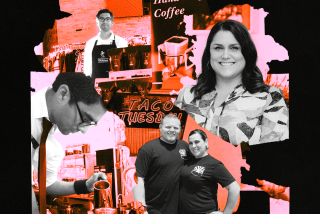A set of Monkeybars to help indie artists sell music
After plummeting for more than a decade, music sales have finally leveled off. Yet the vast majority of artists and bands collect less from music sales than they would from working two weeks at a food court at the mall. It may be easier than ever before to record and distribute songs, but that just means it’s harder than ever to stand out in the crowd at the iTunes Store.
Steve Koskie, a tech entrepreneur and music industry veteran, thinks he can help. Koskie is chief executive of Monkeybars, a Los Gatos, Calif.-based site the gives artists the tools to sell their music virally through their websites, blogs, Facebook, Twitter and hundreds of other outlets.
Monkeybars enables artists who control their own copyrights (unsigned bands, typically, but also well-known artists no longer bound by major-label contracts) to distribute MP3s and videos at whatever price they choose. That’s not new; plenty of companies offer that service, typically for a fee. The twist added by Monkeybars is the financial incentive it gives customers to promote the music they buy -- or even just listen to -- on social media. If a referral leads to a sale, even indirectly, the Monkeybars customer who made it collects a cut of the transaction.
Artists determine how much of the sales price they’ll keep and how much they’ll set aside for referral rewards. The rewards range from 30% of the set-aside amount (when someone buys a track directly from your referral) to 3% (when someone who you’ve introduced to Monkeybars buys a track on someone else’s recommendation). Monkeybars keeps whatever’s left of the set-aside amount after all the rewards are paid. It also collects monthly fees from those who subscribe to the site in order to receive more storage (for artists) or higher reward percentages (for consumers).
Here’s another unusual feature: The rewards are in cash, not credits or merchandise.
Not only does Monkeybars offer artists a chance to generate revenue right away, Koskie said, but they can also make 40% to 120% more than they can through other services that impose fees or demand a larger cut of the sales. The amounts so far have been small, though. Koskie estimated that the site has generated $35,000 a month in sales for roughly 700 artists, or about $50 per artist. But then, Monkeybars is still in its infancy.
On Wednesday, the company will start trying to raise its profile by launching a monthlong series of showcases for new artists. It will also come out of beta, adding tutorials and additional tools to help artists analyze how Monkeybars users respond to their music and connect directly with fans. Meanwhile, Koskie said that some of Monkeybars’ “A-list” advisors, including singer Akon and producer Timbaland, would take a more visible role in promoting the site.
Koskie has been tapping his connections in the music industry -- he worked for almost a decade with the Black Eyed Peas, developing their DipDive platform -- to bring independent artists to Monkeybars. He acknowledged that unknown artists may want to build an audience by giving away tracks rather that selling them, and noted that Monkeybars lets them do that too. But most artists like to limit givaways to a single track that seeds the network, Koskie argued.
The idea of giving music buyers an incentive to promote songs to their friends has been around for years, yet no one seems to have found a way to build a business around that concept alone. A good example from the mid-2000s is PassAlong Networks, whose technology enabled online music stores to reward customers (with credits, not cash) for recommending songs to friends. The company shut down in 2009.
Randy Acker, an artist manager and attorney who’s an advisor to Monkeybars and a consultant to Timbaland, said the approach has always been a good one, but the market wasn’t ready for those previous efforts. (Nor were the major record labels, which for years insisted that companies like PassAlong wrap their songs in electronic locks that prevented them from being played on iPods.) Now, as consumers move from digital to mobile, “the idea of a revenue-sharing collective platform has a good opportunity for a lot of traction,” Acker said.
Monkeybars also presents a different retail experience for consumers from the mass-market online music stores, Acker said. “It’s the difference between the sort of high-end targeted store and one where you can get everything,” he said. “ITunes is like Wal-Mart to me. Customers prefer smaller, more intimate and less of a sort of heavy sales mentality when they’re shopping. It’s so much about the process of discovery. I don’t feel like iTunes lends itself to that at all.”
The goal for artists, he added, is expanding from their core fanbase to the people they influence, who can connect them in turn to a much larger audience. Monkeybars can contribute to that process, Acker said, but it’s just one part of the puzzle for emerging artists.
Acker said that five artists from the label Timbaland launched, the Mosley Music Group, have started using Monkeybars. When asked about the results, he said, “They’re seeing action. I don’t think the numbers yet fully indicate where it can go. Then again, we’re early.”
ALSO:
Netflix’s earnings tumble amid global expansion
Facebook shares rise 10% on better-than-expected earnings
Tale of the tape: Comparing the iPad mini, the Nexus 7 and the Kindle Fire HD
Healey writes editorial for The Times’ Opinion Manufacturing Division. Follow him on Twitter @jcahealey







